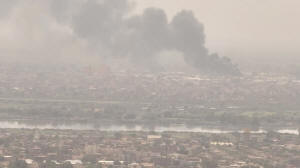Air strikes, tank fire rock Sudan's capital region despite truce pledge
 Send a link to a friend
Send a link to a friend
 [April 28, 2023]
By Khaled Abdelaziz and Nafisa Eltahir [April 28, 2023]
By Khaled Abdelaziz and Nafisa Eltahir
KHARTOUM (Reuters) - Strikes from the air, tanks and artillery shook
Sudan's capital of Khartoum on Friday and a heavy bombardment pounded
the adjacent city of Bahri, witnesses said, even though the army and a
rival paramilitary force agreed to extend a truce by 72 hours.
Hundreds have been killed and tens of thousands have fled for their
lives in a power struggle between the army and the Rapid Support Forces
(RSF) that erupted on April 15 and disabled an internationally backed
transition to democracy.
In persisting ceasefire violations that the United States called
worrying, heavy gunfire and detonations rattled residential
neighbourhoods of the capital region where fighting has been
concentrated over the past week.
Thick smoke was rising above two areas of Bahri.
"The situation this morning is very scary. We hear the sounds of planes
and explosions. We don't know when this hell will end," said Bahri
resident Mahasin al-Awad, 65. "We're in a constant state of fear for
ourselves and our children."

Sudan's army has been directing air strikes with jets or drones on RSF
forces spread out in neighbourhoods across the capital where many
residents are pinned down by urban warfare with little access to food,
fuel, water and electricity.
In a statement, the RSF accused the army of violating a U.S.- and
Saudi-brokered truce pact by carrying out air strikes on its bases in
Omdurman, Khartoum's sister city at the confluence of the Blue and White
Nile rivers, and Mount Awliya.
A Turkish evacuation plane came under fire as it was landing at Wadi
Seyidna airport in Omdurman on Friday but there were no injuries,
Turkey's defence ministry said.
Shortly before, Sudan's army accused the RSF of firing at the plane,
damaging its fuel system which was being repaired after the aircraft
managed to land safely. The RSF denied attacking the plane, accusing the
army of "spreading lies".
The RSF said the army's air strikes were impeding evacuation efforts by
foreign diplomatic missions.
Fighting has also spread to the Darfur region, where conflict has
simmered since a brutal civil war erupted two decades ago, and threatens
to compound instability across a volatile swathe of Africa between the
Sahel and the Red Sea.
U.N. humanitarian office spokesperson Ravina Shamdasani said at least 96
people had been killed in Darfur since Monday by inter-communal violence
rekindled by the army-RSF conflict.
"It is deeply alarming that inmates have been released from or escaped
from a number of prisons, and we are very worried about the prospect of
further violence amid a generalised climate of impunity," she told a
briefing in Geneva.
The Sudan Doctors Union said on Friday that at least 387 civilians had
been killed and 1,928 injured in the fighting since April 15, which has
also caused a humanitarian crisis.

[to top of second column]
|

Plums of smoke rise amidst clashes
between the paramilitary Rapid Support Forces and the army, in Bahri,
Khartoum North (filmed from Omdurman), Sudan April 28, 2023, in this
screen grab from a social media video. Video Obtained by REUTERS

Relief agencies have been largely unable to distribute food to the
needy in Africa's third-largest country, where a third of its 46
million people were already reliant on donations.
MORE EVACUATIONS, REFUGEES
Saudi Arabia said two more evacuation ships had arrived in Jeddah,
across the Red Sea from Sudan, on Friday carrying 252 people in all
from various countries, raising to more than 3,000 the total Riyadh
has rescued, most of them other nationalities.
Among Sudan's neighbours, Egypt said it had taken in 16,000 people,
20,000 had entered Chad and 10,000 had crossed into South Sudan,
which won independence from Khartoum in 2011 after decades of
shattering civil war.
"The clock is ticking fast. We're working as swiftly as we can ...
to deploy where it's possible and safe to do so," U.N. refugee
agency (UNHCR) spokesman Matthew Saltmarsh said.
"This region has suffered decades of hardship, deprivation and
conflict. Given the sheer scale of the country with its seven
borders and the speed at which events are moving..., precise
(refugee) numbers are still hard to come by."
Dodging the fighting wherever possible, Sudanese civilians have been
fleeing Khartoum, one of Africa's largest cities which that had long
been untouched by Sudan's string of civil wars.
The army and RSF said earlier they had agreed to extend the
ceasefire to midnight on Sunday to prolong one that expired on
Thursday night that had brought a partial lull and allowed
diplomatic evacuations to gather pace.
The news was welcomed by the United Nations, African Union, African
trade bloc IGAD and the so-called quad countries of the U.S.,
Britain, Saudi Arabia and the United Arab Emirates. In a statement,
they emphasised that the goal was a more durable ceasefire and
untrammelled access for humanitarian operations.

But the White House said on Thursday it was deeply concerned by the
myriad ceasefire violations and that conditions could worsen at any
moment.
Army chief General Abdel Fattah al-Burhan's office said on Friday he
had received calls of support for restoring calm from several
regional leaders including South Sudan's president and Ethiopia's
prime minister, the Saudi foreign minister and a diplomatic grouping
that includes the United States and Britain.
Friction had been building for months between Sudan's army and the
RSF, whose 2021 coup came two years after a popular uprising toppled
long-ruling Islamist autocrat Omar al-Bashir.
(Reporting by Khaled Abdelaziz, Eltayeb Siddig in Khartoum, Nafisa
Eltahir in Cairo, Gabrielle Tetrault-Farber and Emma Farge in
Geneva, Denis Elamu in Juba; writing by Mark Heinrich; editing by
Robert Birsel, William Maclean)
[© 2023 Thomson Reuters. All rights
reserved.]This material may not be published,
broadcast, rewritten or redistributed.
Thompson Reuters is solely responsible for this content. |